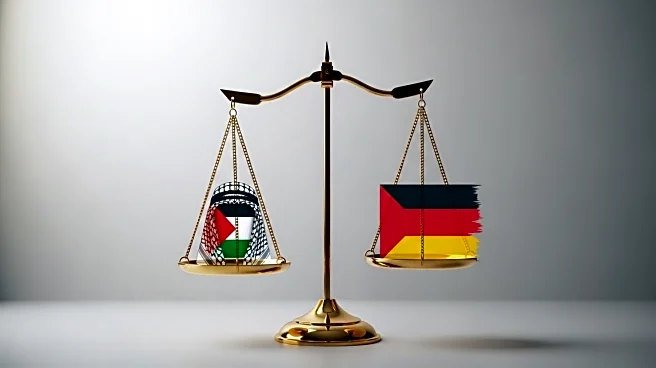What's Happening?
Germany is contemplating providing financial aid to the Palestinian Authority (PA) due to Israel's ongoing refusal to transfer tax revenues collected on behalf of the PA. German Development Minister Reem Alabali Radovan has proposed transferring approximately 30 million euros through an EU mechanism to support salaries in the health and education sectors in the West Bank. This proposal is under debate within Germany's coalition government, with no final decision made yet. The tax revenue freeze by Israel, which began in May, has severely impacted the PA's ability to pay salaries and maintain essential services, raising concerns that militant groups like Hamas could exploit the situation. The freeze stems from Israel's withholding of customs duties and taxes as per the Oslo peace accords of the 1990s.
Why It's Important?
The potential financial aid from Germany is significant as it could alleviate the PA's financial crisis, which has been exacerbated by Israel's tax revenue freeze. This situation has placed the PA under unprecedented political and financial pressure, threatening stability in the West Bank. The aid could help maintain essential services and prevent further instability, which could be exploited by militant groups. However, there is concern within Germany's conservative-led government about ensuring that the funds do not jeopardize Israel's security. The broader geopolitical implications include potential shifts in regional alliances and the balance of power, as well as the humanitarian impact on Palestinian civilians.
What's Next?
Germany's coalition government will continue to debate the proposal, with some members expressing the need for clarification on the allocation of funds to ensure they do not compromise Israel's security. The PA is likely to continue seeking international support to address the financial shortfall caused by the tax revenue freeze. The situation may prompt further diplomatic efforts to resolve the tax revenue dispute between Israel and the PA, potentially involving other international stakeholders. The outcome of Germany's decision could influence future international aid strategies and diplomatic relations in the region.
Beyond the Headlines
The tax revenue freeze and Germany's potential aid highlight the complex interplay of international diplomacy, economic dependencies, and regional security concerns. The situation underscores the fragile nature of peace agreements and the challenges in maintaining stability in conflict-prone areas. It also raises ethical questions about the responsibilities of international actors in supporting humanitarian needs while balancing geopolitical interests. Long-term implications could include shifts in international aid policies and increased scrutiny of financial aid allocations in politically sensitive regions.









